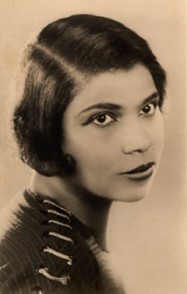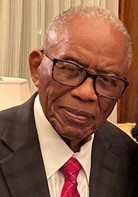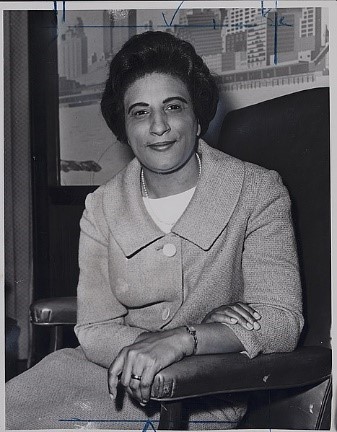Black History Month Spotlight: Celebrating Trailblazing Black Attorneys
In celebration of Black History Month, Cowan, Liebowitz & Latman invites you to learn about three trailblazing black attorneys who changed the face of law in the United States.
Charlotte E. Ray
 Charlotte E. Ray was the first black female lawyer in the United States. Her story begins with her father, Charles Bennett Ray, a prominent abolitionist. She was born in New York City, and raised in Washington, D.C. Ray completed her undergraduate education at what is now the University of the District of Columbia. After graduating in 1869, Ray started teaching at Howard University. While teaching, she enrolled in the law school, allegedly under the alias “C.E. Ray.” She completed a three-year program and became the first woman to graduate from Howard University’s School of Law in 1872. In that same year, she was admitted to the District of Columbia Bar and admitted to practice before the Supreme Court of the District of Columbia, after which Ray opened her own law practice. Ray was a formidable and knowledgeable attorney with great expertise; however, because of her race and sex, she was unable to establish a sufficient client base to sustain her practice. Eventually, she closed her practice, moved to New York and returned to her teaching roots in the Brooklyn school system. Charlotte E. Ray demonstrated that African Americans could practice and excel in the field of law.
Charlotte E. Ray was the first black female lawyer in the United States. Her story begins with her father, Charles Bennett Ray, a prominent abolitionist. She was born in New York City, and raised in Washington, D.C. Ray completed her undergraduate education at what is now the University of the District of Columbia. After graduating in 1869, Ray started teaching at Howard University. While teaching, she enrolled in the law school, allegedly under the alias “C.E. Ray.” She completed a three-year program and became the first woman to graduate from Howard University’s School of Law in 1872. In that same year, she was admitted to the District of Columbia Bar and admitted to practice before the Supreme Court of the District of Columbia, after which Ray opened her own law practice. Ray was a formidable and knowledgeable attorney with great expertise; however, because of her race and sex, she was unable to establish a sufficient client base to sustain her practice. Eventually, she closed her practice, moved to New York and returned to her teaching roots in the Brooklyn school system. Charlotte E. Ray demonstrated that African Americans could practice and excel in the field of law.
Fred David Gray
 Fred Gray has been a key figure in the legal and political spheres since the Civil Rights Era. Born and raised in Alabama, Gray earned his Bachelor’s degree from the present-day Alabama State University. At the advice of a teacher, Gray enrolled in Case Western Reserve University School of Law, where he received his J.D. in 1954. After passing the bar exam, he returned to his home state and opened a law office. Gray started his career as a solo practitioner and garnered much attention for his work with Martin Luther King, Jr. and E.D. Nixon, another important figure in organizing the Montgomery Bus Boycott and prominent union organizer. Gray argued many ground-breaking cases for civil rights, including the defense of Claudette Colvin and Rosa Parks, Browder v. Gayle (which desegrated the Alabama bus system), Dixon v. Alabama (recognized the due process rights of students), and Gomillion v. Lightfoot (forbidding states from gerrymandering to disenfranchise voters based on race). Gray was an indefatigable attorney who filed lawsuits to help desegregate over 100 school systems, colleges, and universities in Alabama. He went on to run for the Alabama House of Representatives. In 1970, he became one of the first Black elected legislators in the state since Reconstruction. He remained in the Alabama legislature until 2015, before returning to practicing law full-time. Although he is 91 years old, Gray continues to practice full-time.
Fred Gray has been a key figure in the legal and political spheres since the Civil Rights Era. Born and raised in Alabama, Gray earned his Bachelor’s degree from the present-day Alabama State University. At the advice of a teacher, Gray enrolled in Case Western Reserve University School of Law, where he received his J.D. in 1954. After passing the bar exam, he returned to his home state and opened a law office. Gray started his career as a solo practitioner and garnered much attention for his work with Martin Luther King, Jr. and E.D. Nixon, another important figure in organizing the Montgomery Bus Boycott and prominent union organizer. Gray argued many ground-breaking cases for civil rights, including the defense of Claudette Colvin and Rosa Parks, Browder v. Gayle (which desegrated the Alabama bus system), Dixon v. Alabama (recognized the due process rights of students), and Gomillion v. Lightfoot (forbidding states from gerrymandering to disenfranchise voters based on race). Gray was an indefatigable attorney who filed lawsuits to help desegregate over 100 school systems, colleges, and universities in Alabama. He went on to run for the Alabama House of Representatives. In 1970, he became one of the first Black elected legislators in the state since Reconstruction. He remained in the Alabama legislature until 2015, before returning to practicing law full-time. Although he is 91 years old, Gray continues to practice full-time.
Constance Baker Motley
 Constance Baker Motley was an essential legal strategist during the Civil Rights movement. She was born to West Indian parents in New Haven, CT. and graduated high school with honors. She lacked the means to attend college and instead went to work after finishing high school. She was very active in her community and was a passionate speaker. Her speaking abilities caught the attention of a local philanthropist who offered to finance her undergraduate education. As a result, she was able to attend Fisk University before transferring to New York University where she earned her Bachelor’s degree in 1943. She continued her education at Columbia Law School, earning a Bachelor of Law degree in 1946. During her second year at Columbia, Future Supreme Court Justice, Thurgood Marshall, hired Baker Motley as a law clerk at the NAACP Legal Defense Fund. After graduating from Columbia, she joined the NAACP as a civil rights attorney. She quickly climbed the ranks and was a lead trial attorney for a number of the NAACP’s early civil rights cases. Baker Motley became the first black woman to argue before the Supreme Court in the case of Meredith v. Fair in 1962. Baker Motley argued before the Supreme Court ten times throughout her career and was successful in nine of those cases. Her efforts contributed to the desegregation of Southern society, from schools to lunch counters. She left the NAACP when she was elected to the New York State Senate in 1964, where she advocated for housing equality. She stayed in the state legislature until 1965, when she was selected to become Manhattan Borough President. Baker Motley did not stay long in that role as President Johnson nominated her for a seat on the District Court for the Southern District of New York. In 1966, the Senate confirmed her appointment, making her the first black female appointed to the federal judiciary. She remained on the Court until her death in 2009.
Constance Baker Motley was an essential legal strategist during the Civil Rights movement. She was born to West Indian parents in New Haven, CT. and graduated high school with honors. She lacked the means to attend college and instead went to work after finishing high school. She was very active in her community and was a passionate speaker. Her speaking abilities caught the attention of a local philanthropist who offered to finance her undergraduate education. As a result, she was able to attend Fisk University before transferring to New York University where she earned her Bachelor’s degree in 1943. She continued her education at Columbia Law School, earning a Bachelor of Law degree in 1946. During her second year at Columbia, Future Supreme Court Justice, Thurgood Marshall, hired Baker Motley as a law clerk at the NAACP Legal Defense Fund. After graduating from Columbia, she joined the NAACP as a civil rights attorney. She quickly climbed the ranks and was a lead trial attorney for a number of the NAACP’s early civil rights cases. Baker Motley became the first black woman to argue before the Supreme Court in the case of Meredith v. Fair in 1962. Baker Motley argued before the Supreme Court ten times throughout her career and was successful in nine of those cases. Her efforts contributed to the desegregation of Southern society, from schools to lunch counters. She left the NAACP when she was elected to the New York State Senate in 1964, where she advocated for housing equality. She stayed in the state legislature until 1965, when she was selected to become Manhattan Borough President. Baker Motley did not stay long in that role as President Johnson nominated her for a seat on the District Court for the Southern District of New York. In 1966, the Senate confirmed her appointment, making her the first black female appointed to the federal judiciary. She remained on the Court until her death in 2009.
As we continue to celebrate Black History Month, Cowan, Liebowitz & Latman encourages you to recognize diversity and inclusion every month.